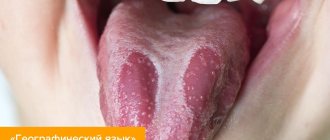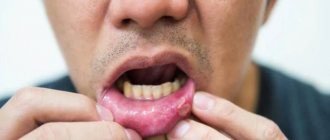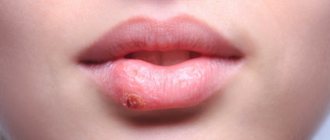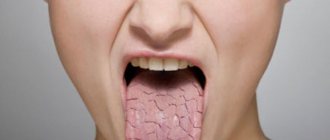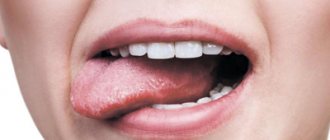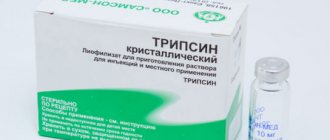- Outpatient department
Outpatient department » - Gastroenterology
Gastroenterology »
- About the direction
About the direction »
- Gastritis: symptoms, diagnosis and treatment
Gastritis is perhaps the most common disease of the gastrointestinal tract. Almost every second resident of our country suffers from it. That is why it is so important to know the first signs and symptoms of this disease in order to start treatment on time and not neglect your health.
Gastritis (from the Latin gastritis, from the ancient Greek γαστήρ (gaster) - “stomach” + -itis inflammatory or inflammatory-dystrophic changes in the mucous membrane) is a collective concept that is used to refer to various inflammatory and dystrophic changes in the gastric mucosa. Damage to the mucous membrane can be primary, considered as an independent disease, caused by poor nutrition, and secondary, caused by other infectious and non-infectious diseases or intoxication.
Types of gastritis
Acute gastritis
In modern medicine, there are several types of acute gastritis:
Simple (catarrhal) gastritis develops as a result of ingestion of stale food contaminated with pathogenic microbes (foodborne toxic infection), rotavirosis, allergies, or as a result of damage to the gastric mucosa by medications. With catarrhal gastritis, the surface layer of the mucous membrane is destroyed, which is quickly restored after the cessation of the irritating factor.
Corrosive (erosive) gastritis. This type of gastritis develops after concentrated acids or alkalis enter the stomach, which corrode the gastric mucosa. In this case, not only the superficial, but also the deep layers of the gastric mucosa are destroyed, so this form of the disease often gives rise to peptic ulcers or the formation of scars.
Phlegmonous gastritis is a purulent inflammation of the stomach that can develop as a result of penetration of a foreign object (for example, a fish bone) into the stomach wall with subsequent infection of this area. A distinctive feature of this type of gastritis is high fever and unbearable pain in the epigastric region. Phlegmonous gastritis requires immediate surgical intervention, as it can develop into peritonitis (extensive inflammation of the abdominal organs) and be fatal.
Fibrinous gastritis. It occurs very rarely against the background of sepsis (blood poisoning).
With proper treatment, acute gastritis (depending on the form) lasts up to 5 - 7 days, but complete recovery of the stomach occurs much later.
Often acute gastritis can become chronic.
Chronic gastritis
Chronic gastritis can develop as a consequence of acute gastritis or as an independent disease. Its danger lies in the fact that it can occur for a long time without showing any symptoms.
In the development of the disease, as a rule, there are periods of exacerbation and remission. During periods of exacerbation of chronic gastritis, short-term attacks of pain, discomfort in the upper abdomen, a feeling of heaviness, nausea after eating, and heartburn may appear, which indicates a dysfunction of the natural “valves” of the stomach and the reflux of acidic stomach contents into the esophagus.
A characteristic feature of chronic gastritis is the gradual growth of connective tissue in the gastric mucosa, replacing the cells that produce gastric juice (atrophy of the gastric mucosa). Chronic gastritis is often accompanied by a decrease in the production of gastric juice and acid (hypoacid gastritis).
Helicobacter pylori infection, which parasitizes the stomach, disrupts the renewal processes of the mucous membrane; thus, when old cells die, new ones cannot be formed. This leads to gradual degradation of the gastric mucosa with loss of function of the glands that produce gastric juice.
Treatment
You should pay close attention to the problem, since ignoring a symptom or delaying seeking help can lead to the following undesirable manifestations:
- Constant feeling of thirst.
- Improper functioning of taste buds.
- Difficulty swallowing.
- Change in tongue color, burning sensation.
- Formation of cracks on the lips and tongue, peeling of the lips.
- Bad breath, plaque formation on the gums and tongue.
- Breathing problems.
If the manifestation of a symptom is provoked by psychogenic disorders, it is recommended to consult a psychotherapist. Therapy for dry mouth during stress will be aimed at finding and subsequently working through the reasons that caused the appearance of undesirable symptoms.
As a rule, after special psychological techniques, both physical and psychological states are normalized. The main methods of psychotherapeutic assistance are Gestalt therapy, cognitive behavioral techniques, NLP, hypnosis and psychoanalytic techniques.
For self-help (at times of severe anxiety), it is suitable to perform breathing exercises and take sedatives (Motherwort or Valerian). You can use the following relaxation technique: short inhale through the nose - long exhale through the mouth. In this case, it is necessary to ensure that exhalations are accompanied by a feeling of complete release of air. You can also take 3-4 short inhalations and exhalations, making sure that the exhalations are as high quality as possible.
We should not forget that the occurrence of discomfort in the oral cavity can be the result of some other problems in the body, namely: influenza, acute respiratory infections, tonsillitis, endocrine disorders, diabetes, anemia.
Bad habits, poor diet, and the use of antibiotics or diuretics can also negatively affect the condition of the oral cavity and cause dryness. If symptoms occur, it is strongly recommended to seek professional help and undergo prescribed treatment.
Causes of gastritis
The main causes of gastritis are:
- poor nutrition;
- hasty eating and poorly chewed food or dry food;
- eating food that is too hot or too cold;
- eating savory foods (mostly spicy and highly salted);
- smoking;
- alcohol consumption;
- stress;
- infection with the microbe Helicobacter pylori;
- chewing gum on an empty stomach.
Symptoms of gastritis
So, how can you recognize that you have begun to develop gastritis? It is worth listening to your body and analyzing why pain bothers you, at what time it occurs and how often it happens.
Symptoms of gastritis:
- abdominal pain: sharp paroxysmal or constant painful;
- nausea is constant or intermittent, often occurring immediately after eating;
- heartburn;
- belching with a sour smell;
- repeated vomiting (in the case of acute gastritis, vomiting with blood is possible, since internal bleeding may open in the stomach);
- increased salivation;
- sometimes dry mouth;
- bowel dysfunction: constipation or diarrhea;
- from the whole body: severe general weakness, dizziness, headache, sweating, increased temperature, decreased blood pressure, increased heart rate - tachycardia;
- decreased appetite;
- unpleasant taste in the mouth;
- feeling of heaviness in the stomach after eating;
- bloating, rumbling in the stomach, flatulence;
- anemia, brittle and dry hair, split nails.
Dry mouth
Sign up for a consultation by phone
Or fill out the form online
Make an appointment An adult produces about one and a half liters of saliva per day on average. It would seem, why so much?
In fact, saliva has many functions.
Firstly, it protects the mucous membranes of the mouth and throat from drying out. Secondly, it protects teeth from caries: it washes away food debris and plaque; slows down the growth of pathogenic bacteria that destroy enamel and cause inflammation of soft tissues; neutralizes acids that form in or enter the mouth. Thirdly, saliva thins food, which makes it easier to swallow and promotes a better sense of taste. And fourthly, saliva contains the digestive enzyme amylase, which begins to digest carbohydrates already in the oral cavity.
The mucous membrane is dried out by breathing through the mouth and snoring - this is most strongly felt upon waking up by people with impaired nasal breathing (for example, with a runny nose) and decreased tone of the soft palate.
There are many reasons for dry mouth, let's look at some of them:
1. Smoking.
Smoking and chewing tobacco causes dry mouth, both due to direct oral contact with smoke and due to decreased saliva production under the influence of nicotine.
2. Excessive salt intake.
Addiction to salty foods also does not contribute to the production of saliva, and the inevitable consumption of large amounts of liquid with salt will sooner or later lead to hypertension. Eating more than 5-7 grams of salt per day is not recommended even for absolutely healthy people.
3. Dehydration.
Dry mouth after physical activity or exposure to a hot, dry climate simply means that the body has lost a lot of moisture and needs to be replenished.
4. Disease.
If dry mouth has been bothering you for a long time, it makes sense to see a doctor - perhaps this is a symptom (sometimes the only one!) of some disease. Most often, dry mouth is a symptom of diabetes.
Also, a decrease in saliva production is observed when the salivary glands are damaged - inflammation, tumor, etc. Dry mouth can also be a symptom of an autoimmune disease - Sjogren's syndrome.
5. Taking medications.
Hundreds of drugs that are used to treat gastrointestinal disorders, cardiovascular diseases, depression and other mental disorders, allergies, infections, malignant neoplasms and other conditions can dry out the oral mucosa.
If dry mouth continues for a long time or appears while taking medication, you should consult a doctor.
Diabetes mellitus is a pathological condition characterized by chronically elevated blood sugar levels, which develops as a result of the influence of hereditary and external factors, threatening the development of serious complications in the eyes, kidneys, blood vessels, and nervous system.
There are two types of diabetes:
- type 1 diabetes,
- type 2 diabetes.
Type I diabetes usually develops in young people whose body does not produce insulin due to damage or loss of beta cells in the pancreas. As a result, the body cannot use glucose and it accumulates in the blood. One of the first symptoms of the disease is dry mouth, thirst, and frequent urination, as the body tries to “flush out” the increasing amount of glucose. Over time, the kidneys can no longer cope with such a load, and abdominal pain, vomiting, and dehydration occur.
Type II diabetes usually develops in people over 40 years of age and who are overweight. They may have normal, low, or even high insulin levels and still have high blood glucose and diabetes. Obesity can contribute to insulin resistance, i.e. The body's cells cannot use insulin properly. In this case, glucose cannot completely penetrate the cells and accumulates in the blood. You can get answers to your questions or make an appointment by calling:
(495) 956-91-03
Benefits of the service
Convenient work schedule
We work until late in the evening to make it convenient for you to take care of your health after work
No queues
The patient registration system has been debugged over many years of work and works in such a way that you will be seen exactly at the chosen time
Cozy interior
It is important to us that patients feel comfortable within the walls of the clinic, and we have done everything to make you feel comfortable
Attention to the patient
At your service there are attentive staff who will answer any question and help you navigate
Diagnosis of gastritis
Today, the main way to determine gastritis is fibrogastroduodenoendoscopy or FGDS, which consists of studying the condition of the inner surface of the stomach using a probe, as well as a biopsy - removing a small fragment of tissue for examination.
FGDS makes it possible not to confuse gastritis and ulcer and to determine the type of disease: erosive or non-erosive.
Also, a gastroenterologist, to make a correct diagnosis, may prescribe the following tests:
- General blood analysis.
- Fecal occult blood test.
- Histological examination of a biopsy specimen of the gastric mucosa.
- Cytological examination of a biopsy specimen of the gastric mucosa.
- Two tests for the determination of H. pylori.
- Blood chemistry.
- General urine analysis.
Diet for gastritis
For gastritis with low acidity
Can:
- boiled lean meat: chicken, rabbit;
- meat broths;
- lean fish: pink salmon, hake, cod;
- vegetables in the form of puree or grated: carrots, potatoes, green peas, beets;
- ground fruits, compotes and jelly from apples, raspberries and strawberries;
- porridge (oatmeal, semolina, rice);
- low-fat cottage cheese, milk;
- only squeezed cabbage juice;
- alkaline mineral waters, for example Borjomi (1 glass an hour before meals).
It is forbidden:
- hot and spicy dishes;
- canned food;
- mustard;
- pepper;
- onion;
- hot sauces.
For gastritis with high acidity
Can:
- pureed vegetarian soups;
- dairy products;
- lean fish and boiled meat;
- scrambled eggs;
- porridge, jelly, jelly;
- vegetable purees;
- compotes from fresh (not sour) fruits;
- carrot juice;
- White bread.
It is forbidden:
- coffee and strong tea;
- meat broths;
- smoked meats;
- mustard;
- onion;
- garlic.
For all types of gastritis, split meals are very important - 5-6 times a day.
Gastritis (from the Latin gastritis, from the ancient Greek γαστήρ (gaster) - “stomach” + -itis inflammatory or inflammatory-dystrophic changes in the mucous membrane) is a collective concept used to refer to inflammatory and dystrophic changes in the gastric mucosa of different origins and course. Damage to the mucous membrane can be primary, considered as an independent disease (due to poor nutrition), and secondary, caused by other infectious and non-infectious diseases or intoxication.
Gastritis is perhaps the most common disease of the gastrointestinal tract. Almost every second resident of our country suffers from it.
If you are really looking for your doctor...
Reactive pancreatitis
Reactive pancreatitis is a reaction of the child’s pancreas to some irritants; it is not a separate disease.
Symptoms of reactive pancreatopathy may occur in a child who has recently suffered:
- ARVI
- other inflammatory diseases
- poisoning with poor quality food products,
- it may also be a reaction to a food allergy.
With reactive pancreatitis, spasm of the pancreatic ducts and swelling of the organ itself occurs.
In children under one year of age, the occurrence of reactive pancreatopathy is associated with:
- improper introduction of complementary foods;
- introduction of grape juice;
- introduction of meat products;
- introduction of seasonings before the prescribed age.
These products not only increase gas formation in the intestines, but also disrupt the functioning of the still immature pancreas.
The most common symptoms of reactive pancreatitis are:
- sharp girdling pain above the navel, which decreases in a sitting position with the torso bent forward;
- severe nausea;
- vomiting of gastric contents;
- temperature rise to 37°C, especially in the first few hours from the onset of the disease;
- stool liquefaction;
- dry mouth;
- white coating on the tongue;
- moodiness;
- irritability;
- refusal of games.
If the above symptoms appear, and especially persistent abdominal pain, you should immediately contact a pediatrician, gastroenterologist, or call an ambulance.
In addition to providing first aid, the doctor will prescribe the necessary examinations (ultrasound of the abdominal organs, tests). Based on the examination results, drug treatment is prescribed.
